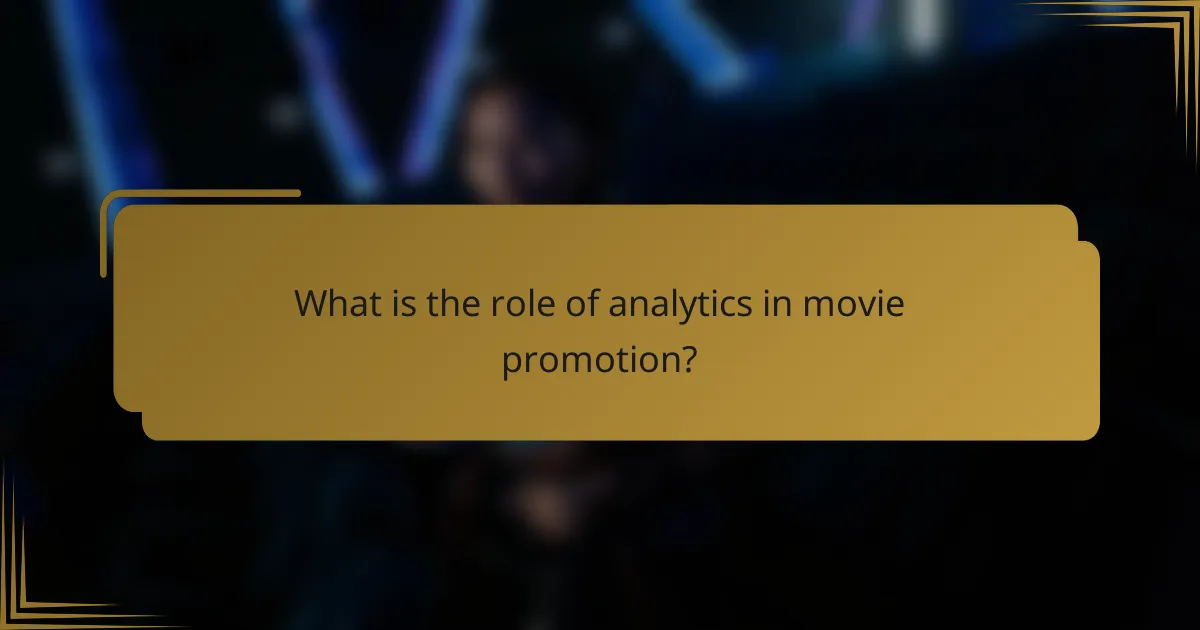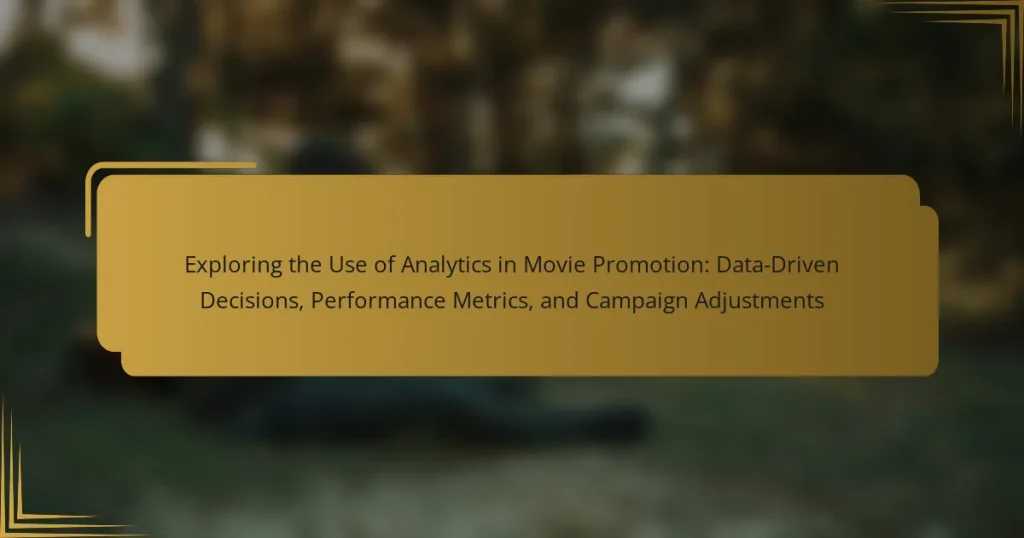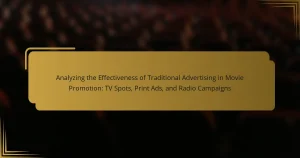
What is the role of analytics in movie promotion?
Analytics plays a crucial role in movie promotion by providing actionable insights into audience behavior. It helps filmmakers and marketers understand viewer preferences, engagement levels, and demographic information. By analyzing data from social media, trailers, and online platforms, stakeholders can tailor promotional strategies effectively.
For instance, analytics can reveal which marketing channels yield the highest engagement. This allows for better allocation of resources to maximize impact. Moreover, performance metrics from previous campaigns can inform future promotional efforts. A study by the Motion Picture Association found that data-driven marketing strategies can increase box office revenues by up to 30%.
Overall, analytics enhances decision-making in movie promotion, ensuring campaigns are targeted and efficient.
How do data-driven decisions influence movie marketing strategies?
Data-driven decisions significantly influence movie marketing strategies by providing insights into audience preferences and behaviors. Marketers analyze data from social media, ticket sales, and demographic information. This analysis helps identify target audiences more accurately. For instance, data can reveal which genres resonate with specific age groups. Consequently, marketing campaigns can be tailored to appeal directly to these segments. Additionally, performance metrics allow for real-time adjustments in strategies. If initial campaigns underperform, data can guide changes to messaging or channels. Studies indicate that data-driven marketing can increase engagement rates by over 20%. Overall, leveraging data enhances the effectiveness and efficiency of movie marketing efforts.
What types of data are most valuable for movie promotion?
Audience demographics are the most valuable data for movie promotion. This includes age, gender, and location of potential viewers. Understanding audience preferences helps tailor marketing strategies. Social media engagement metrics also provide insights into audience interests. Tracking online conversations and sentiments can guide promotional content. Box office performance data indicates the effectiveness of previous marketing efforts. Competitor analysis reveals market trends and successful strategies. Viewer behavior data, such as ticket purchasing patterns, informs promotional timing and channels. All these data types contribute to creating targeted and effective movie marketing campaigns.
How is audience segmentation achieved through analytics?
Audience segmentation is achieved through analytics by analyzing data to categorize consumers into distinct groups. This process involves collecting demographic, behavioral, and psychographic data. Analytics tools then identify patterns and preferences within this data. For example, demographic data may include age, gender, and location. Behavioral data can reveal viewing habits and engagement levels. Psychographic data provides insights into interests and values.
By utilizing machine learning algorithms, marketers can effectively cluster audiences based on these attributes. This segmentation allows for targeted marketing strategies. According to a study by McKinsey, companies that leverage data-driven segmentation see a 10-20% increase in campaign effectiveness. Thus, analytics not only facilitates audience segmentation but also enhances marketing outcomes.
Why are performance metrics essential in movie promotion?
Performance metrics are essential in movie promotion because they provide quantifiable data that informs marketing strategies. These metrics help identify audience engagement levels, such as viewership numbers and social media interactions. By analyzing these figures, marketers can assess the effectiveness of promotional campaigns. For example, a study by the Motion Picture Association found that targeted ads increased ticket sales by 25%. Performance metrics also allow for real-time adjustments to marketing tactics. This adaptability can lead to improved audience reach and better return on investment. Ultimately, leveraging performance metrics enhances the overall success of movie promotions.
What key performance indicators (KPIs) should be tracked?
Key performance indicators (KPIs) that should be tracked in movie promotion include box office revenue, audience engagement metrics, and social media reach. Box office revenue measures the financial success of a film. Audience engagement metrics, such as ticket sales and viewer ratings, provide insights into audience interest and satisfaction. Social media reach tracks the effectiveness of promotional campaigns across platforms. These KPIs help assess the overall impact of marketing strategies and guide future promotional efforts.
How do these metrics inform campaign effectiveness?
Metrics inform campaign effectiveness by providing quantifiable data on performance. They help identify which strategies yield the best results. For instance, metrics such as engagement rates and conversion rates indicate audience interest and response. High engagement rates suggest successful content resonance with the target audience. Conversely, low conversion rates may signal the need for strategy adjustments. Metrics also allow for real-time monitoring of campaign performance. This enables quick decision-making to optimize ongoing efforts. Historical data comparison reveals trends and patterns, guiding future campaigns. Overall, metrics serve as a critical tool for assessing and enhancing campaign effectiveness.
What are the common challenges faced in using analytics for movie promotion?
Common challenges faced in using analytics for movie promotion include data integration, data accuracy, and audience targeting. Data integration issues arise when combining information from multiple sources. This can lead to incomplete or inconsistent datasets. Data accuracy is crucial; erroneous data can mislead marketing strategies. Additionally, understanding audience preferences is complex. Analytics may not capture the full spectrum of viewer behavior. Budget constraints can limit access to advanced analytical tools. Finally, interpreting data insights can be challenging without skilled personnel. These obstacles can hinder effective movie promotion strategies.
How can data privacy issues impact analytics in marketing?
Data privacy issues can significantly impact analytics in marketing by limiting data collection and usage. Stricter regulations, such as GDPR and CCPA, require businesses to obtain explicit consent from users. This reduces the volume of available data for analysis, leading to less accurate insights. Additionally, consumers may opt-out of tracking, further diminishing data quality. When data is anonymized, it can hinder the ability to segment audiences effectively. Consequently, marketers may struggle to personalize campaigns, reducing engagement and conversion rates. A study by McKinsey found that companies prioritizing data privacy can enhance customer trust, but they must balance compliance with effective analytics strategies.
What are the limitations of relying solely on analytics?
Relying solely on analytics has several limitations. Analytics can provide data but may lack context. This means that insights derived from numbers may misrepresent audience sentiments. Additionally, analytics often focus on past performance rather than predicting future trends. This can hinder the ability to adapt to changing market dynamics.
Moreover, over-reliance on analytics can lead to neglecting creative aspects of movie promotion. Creativity often drives audience engagement in ways that data cannot quantify. Furthermore, analytics may not capture qualitative factors, such as brand perception and emotional connections.
Finally, data privacy concerns can limit the scope of analytics. Regulations like GDPR restrict how consumer data is collected and analyzed. These limitations highlight the need for a balanced approach that combines data with human insight and creativity.
How can analytics drive adjustments in movie marketing campaigns?
Analytics can drive adjustments in movie marketing campaigns by providing data on audience engagement and preferences. By analyzing viewer demographics, marketers can tailor their messaging to specific groups. Performance metrics such as click-through rates and social media interactions reveal which promotional strategies are effective. This data allows for real-time optimization of marketing efforts. For instance, if a particular ad format underperforms, adjustments can be made quickly. Additionally, analytics can track ticket sales and audience feedback post-release. This information helps refine future campaigns and promotional strategies. Ultimately, data-driven insights lead to more effective marketing decisions and improved box office performance.
What methods are used to analyze campaign performance?
Campaign performance can be analyzed using various methods. These methods include A/B testing, which compares two versions of a campaign to determine which performs better. Another method is analyzing key performance indicators (KPIs) such as click-through rates, conversion rates, and return on investment (ROI). Surveys and audience feedback provide qualitative insights into campaign effectiveness. Social media analytics track engagement metrics like shares, likes, and comments. Web analytics tools measure traffic sources and user behavior on campaign landing pages. Additionally, sentiment analysis gauges public perception of the campaign through social media and online reviews. These methods collectively provide a comprehensive view of campaign performance, enabling data-driven adjustments.
How can real-time data influence marketing tactics?
Real-time data can significantly influence marketing tactics by enabling immediate adjustments to campaigns. Marketers can analyze consumer behavior as it happens. This allows for targeted messaging based on current trends and preferences. For instance, if a social media post is performing well, marketers can amplify its reach instantly. Additionally, real-time data helps in understanding audience demographics and engagement levels. According to a study by McKinsey, companies that leverage real-time data can increase their marketing ROI by up to 15-20%. This demonstrates the tangible benefits of utilizing real-time insights in marketing strategies.
What best practices should be followed for effective analytics in movie promotion?
Effective analytics in movie promotion involves several best practices. First, define clear objectives for the campaign. This helps in measuring success accurately. Second, utilize a variety of data sources. Combining social media metrics, box office data, and audience feedback provides a comprehensive view. Third, segment the audience based on demographics and preferences. This allows for targeted marketing strategies.
Fourth, implement A/B testing for promotional materials. Testing different trailers or posters can reveal what resonates best with viewers. Fifth, analyze competitors’ strategies. Understanding what works for others can inform your own tactics.
Sixth, track performance metrics continuously. Monitoring engagement rates and ticket sales helps in making timely adjustments. Lastly, leverage advanced analytics tools. Tools like Google Analytics and social media insights provide valuable data for decision-making. These practices ensure that movie promotion efforts are data-driven and effective.
How can marketers ensure data accuracy and reliability?
Marketers can ensure data accuracy and reliability by implementing robust data validation processes. These processes include cross-checking data against multiple sources to confirm its correctness. Regular audits of data collection methods help identify and rectify errors. Additionally, using automated tools can minimize human error in data entry. Marketers should also establish clear data governance policies. These policies outline standards for data quality and management. Training staff on these standards reinforces the importance of accurate data handling. Implementing these strategies can lead to more reliable analytics outcomes in movie promotion.
What tools are recommended for optimizing movie promotion analytics?
Google Analytics is recommended for optimizing movie promotion analytics. It provides insights into website traffic and user behavior. Facebook Insights offers data on audience engagement and demographics. Twitter Analytics tracks tweet performance and audience interactions. Hootsuite allows for monitoring social media campaigns and scheduling posts. Tableau helps visualize data trends and campaign effectiveness. Adobe Analytics provides in-depth customer journey analysis and reporting. These tools collectively enhance understanding of audience engagement and campaign performance, facilitating data-driven decision-making in movie promotion.
What future trends can be expected in analytics for movie promotion?
Future trends in analytics for movie promotion will focus on enhanced personalization and real-time data utilization. Advanced algorithms will enable tailored marketing strategies based on individual viewer preferences. This shift will use machine learning to analyze viewer behavior more effectively. Predictive analytics will help studios forecast audience engagement and box office performance. Social media sentiment analysis will become crucial for understanding audience reactions. Integration of augmented reality will enhance promotional experiences and engagement. Data privacy regulations will shape how analytics are conducted. These trends will ultimately lead to more efficient and targeted movie promotion strategies.
How might emerging technologies impact data analysis in marketing?
Emerging technologies significantly enhance data analysis in marketing. They enable real-time data processing and analysis, allowing marketers to make quicker decisions. Advanced analytics tools, powered by artificial intelligence, can identify patterns in consumer behavior. This leads to more targeted marketing strategies. Machine learning algorithms can predict future trends based on historical data. As a result, businesses can optimize their campaigns for better performance. Additionally, technologies like blockchain improve data security and transparency. This builds consumer trust and enhances data integrity. Overall, these technologies transform how marketers analyze and act on data insights.
What role will artificial intelligence play in future movie promotions?
Artificial intelligence will significantly enhance future movie promotions. AI can analyze vast amounts of data to identify audience preferences. This allows for personalized marketing strategies tailored to specific demographics. For instance, AI algorithms can predict which trailers resonate best with target audiences. Additionally, AI can optimize ad placements for maximum visibility and engagement. Historical data shows that AI-driven campaigns can increase conversion rates by up to 30%. Moreover, AI can automate social media interactions, improving customer engagement and brand loyalty. By leveraging machine learning, studios can continuously refine their promotional tactics based on real-time feedback.
How can filmmakers leverage analytics for better audience engagement?
Filmmakers can leverage analytics to enhance audience engagement by analyzing viewer preferences and behaviors. They can track metrics such as watch time, demographic data, and social media interactions. This data helps identify what content resonates most with audiences. Filmmakers can use insights to tailor marketing strategies and promotional content. For instance, targeted advertising can be adjusted based on viewer engagement statistics. A study by the Motion Picture Association found that data-driven marketing can increase ticket sales by up to 30%. By continuously monitoring analytics, filmmakers can adapt their strategies in real-time to maximize audience connection.
The main entity of the article is analytics in movie promotion. The article explores the critical role of analytics in understanding audience behavior, preferences, and engagement levels, which informs data-driven marketing strategies. It highlights the importance of performance metrics and key performance indicators (KPIs) in assessing campaign effectiveness and making real-time adjustments. Additionally, the article addresses challenges in data integration and privacy issues while emphasizing best practices for leveraging analytics to enhance audience engagement and optimize promotional efforts. Emerging technologies and artificial intelligence’s impact on future movie promotions are also discussed, showcasing how analytics can drive successful marketing campaigns.




